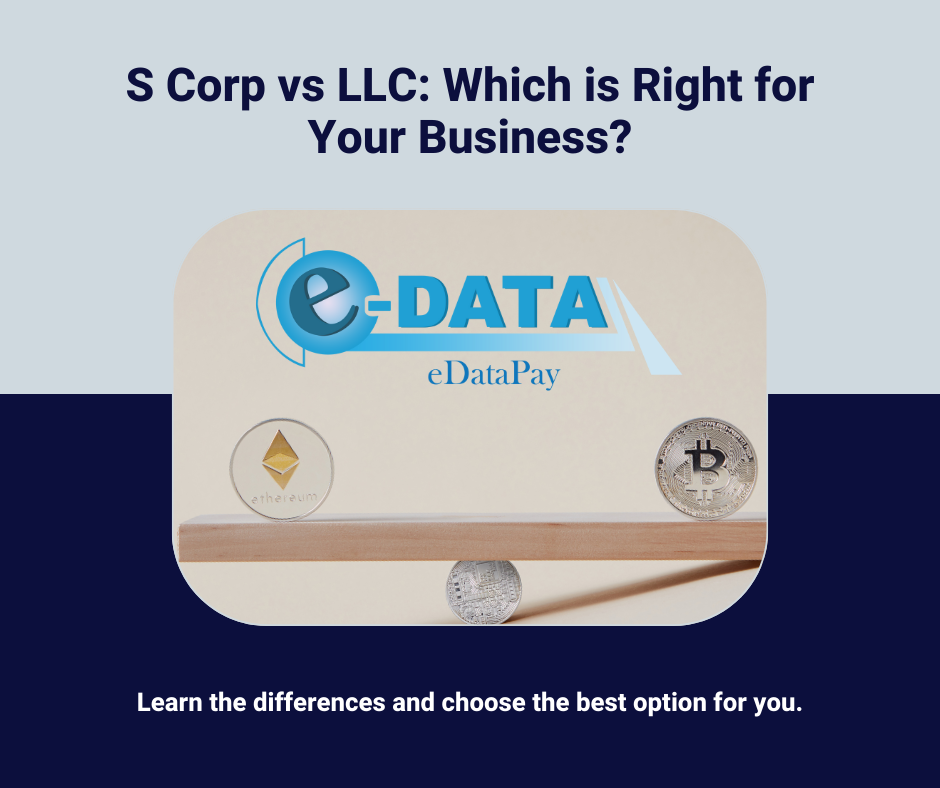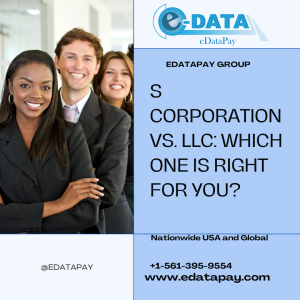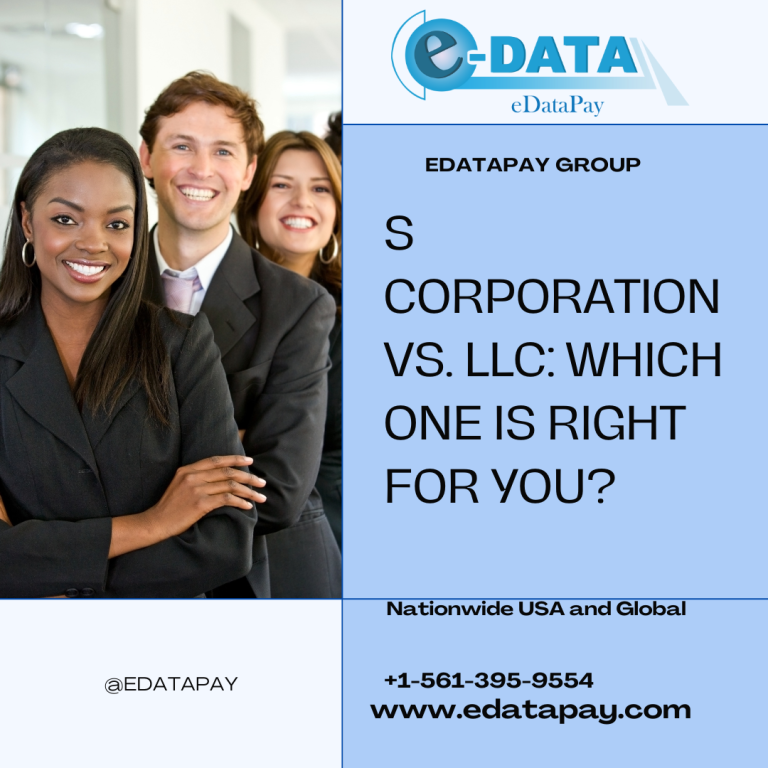S Corporation vs. LLC: How to Choose the Best Structure for Your Business
Which corporate structure is best for your business? You may already be familiar with the words “limited liability company” (LLC) and “S corporation” (S corp). But what are the distinctions between these two company forms, and how do they affect businesses?
LLCs and S corporations are among the most frequent business entities in the United States. With so many entrepreneurs choosing one of these two structures, it’s critical to grasp the differences between LLCs and S corporations in order to select the best option for your firm.
Here’s a full breakdown of the fundamental distinctions between LLCs and S corporations, including everything you need to know to decide which form is best for you.
What’s in this article?
- What is an LLC?
- What is a S corporation?
- What’s the distinction between a S corporation and an LLC?
- Can an LLC be a S corporation?
- Can a S corporation own an LLC?
- What are the advantages and disadvantages of LLCs versus S corporations?
- How to pick between an LLC and a S corporation.
What is an LLC?
LLC stands for “limited liability company.” It is a business structure that combines the limited liability protection of a corporation with the flexibility and tax advantages of a partnership. Forming an LLC establishes a firm as a separate legal entity from its owners, known as members, which means they are not personally liable for the business’s debts and responsibilities. This legal distinction gives the owners more protection.
LLCs can be taxed as either a corporation or a pass-through entity, with income and losses passed on to the members’ personal tax returns.

What is a S corporation?
An S corporation (S corp) is a sort of business structure that is best suited to small and medium-sized firms that seek to avoid the double taxation that can occur with a standard corporation.
In a S corporation, the company’s profits and deductions are passed on to the shareholders’ personal tax returns, while the company itself does not pay federal income tax. This means that the S corp’s shareholders are only taxed once on the firm’s profits, rather than twice as both shareholders and the corporation.
To be eligible for S corp status, a company must meet specific criteria, including having no more than 100 shareholders and being incorporated as a domestic corporation. S corporations are a popular choice for enterprises that require the liability protection of a corporation but wish to be taxed as a partnership or sole proprietorship.
What is the distinction between a S corporation and an LLC?
While both S companies and LLCs give their owners with limited liability protection and allow for flexibility in taxes and management structure, there are significant variations between them. Finally, the decision to form a S corporation or an LLC is driven by the business owners’ individual needs and ambitions. Here’s a summary of the primary distinctions between these two options:
- Taxes
The primary distinction between S corporations and LLCs is how they are taxed. S companies are treated as pass-through entities, which means that income and losses are reflected on the shareholders’ personal tax returns, but LLCs can be taxed as either a pass-through entity or a corporation.
- Ownership restrictions apply to S corporations, including a maximum of 100 shareholders who must be US citizens or residents. LLCs are not subject to such restrictions. Furthermore, S corporations can only issue one class of stock, but LLCs can have many types of ownership interests.
- Flexible management structure: LLCs can be controlled by owners (“member managed”) or a chosen manager (“manager managed”). S corporations must have a board of directors and officers.
- S corporations require more formalities and reporting than LLCs, including regular meetings and record-keeping. Can an LLC be a S corporation?
Yes, an LLC can choose to be treated as a S corporation, allowing it to benefit from pass-through taxation while keeping the flexibility and limited liability protection of an LLC. To qualify for S corp taxation, the LLC must meet certain conditions, such as having no more than 100 shareholders (all of whom are US citizens or residents), having only one class of stock, and adhering to certain restrictions on the categories of shareholders and shares that may be issued.
While an LLC can choose to be taxed as a S corporation, it is still considered an LLC under state law and must follow all of the criteria and regulations that govern LLCs in the state where it is registered. In addition to meeting the requirements for LLCs, companies who choose S corp taxation may be subject to extra S corp laws and restrictions. It can get confusing, which is why you should consult with a tax attorney and accountant to ensure your company is making the proper tax elections and meeting all associated obligations.
Can a S corporation own an LLC?
Yes, a S company can own stock in other corporations or have interests in other types of enterprises, such as LLCs. If a S corporation owns an LLC, the LLC is classified as a separate legal entity, and the S corporation’s ownership stake in the LLC is considered an asset. The S corp will disclose its ownership interest in the LLC on its tax return, and any income or losses earned by the LLC will be passed on to the S corp and reported on the S corp’s tax return.
In this case, the S corp would be regarded the LLC’s parent company or holding company, with the LLC serving as a subsidiary or wholly owned subsidiary of the S corporation. The S corp would have the authority to make decisions and execute acts on behalf of the LLC, as well as be responsible for any liabilities or debts incurred by the LLC.

What are the advantages and disadvantages of LLCs versus S Corporations?
Both LLCs and S companies have advantages and disadvantages, depending on the needs of the firm. Below are some of the advantages and disadvantages of each structure:
Benefits of an LLC:
- Flexibility.
LLCs provide flexibility in terms of ownership, management structure, and tax status. They can be owned by one or more individuals, managed by the owners or a designated manager, and taxed as a pass-through organization or corporation.
- Limited liability.
LLCs, like S corporations, offer limited liability protection to owners, ensuring their personal assets are not affected by the business’s debts and obligations. Additionally, there are less formalities involved.
LLCs often have fewer formality and reporting requirements than S corporations, making them easier—and less expensive—to administer.
Drawbacks of an LLC.
- Self-employment taxes.
LLC owners must pay self-employment taxes on all profits, which may be more than those paid by S corp stockholders.
- Limited lifespan.
Some states require LLCs to be dissolved after a specified period or event, such as an owner’s death. This can result in limited access to funds.
LLCs may have fewer capital-raising alternatives than S corporations, such as stock offers or investor takeovers.
Benefits of a S Corporation
- Pass-through taxation.
S corporations are pass-through entities, meaning income and losses are passed through to shareholders’ personal tax returns, potentially resulting in cheaper overall taxes. • Self-employment taxes
S corporation owners can avoid some self-employment taxes by paying themselves a salary and receiving additional profits as distributions, which are exempt from self-employment taxes.
- Restrictions for shareholders.
S corps have restrictions on who can be a shareholder and how many stockholders the corporation can have, making this structure appealing to smaller enterprises looking to limit the number of owners.
Drawbacks of a S Corp.
- Increased formality.
S corps must attend frequent meetings, keep extensive documents, and adhere to various procedures in order to maintain their status.
- Limited ownership choices.
S corporations cannot have more than 100 shareholders, who must be people or specific types of trusts.
- Eligibility requirements.
S corporation must meet specific qualifying criteria, such as having an owner who is a US citizen or resident alien.
How to pick between an LLC and a S corporation.
Think about your specific ownership structure, management preferences, taxation, liability protection, and business goals. Consider the firm as a whole, the long-term path you hope it will take, and which parts of each structure are most essential to you as an owner. The decision is both logical and subjective, which makes it difficult to make.
Here are some steps to consider while deciding between an LLC and a S corporation:
- Assess your business needs.
Consider the type of business you run, the number of owners or shareholders, the industry you operate in, and your long-term objectives for the company.
- Understand tax ramifications.
Compare the tax benefits and drawbacks of each structure, such as pass-through taxation for LLCs and S corps, self-employment taxes for LLCs, and the possibility of tax savings with S corporations. There are advantages and disadvantages to both options, so the circumstances of your organization will determine which is best for you.
- Consider liability protection.
Both LLCs and S corporations give limited liability protection for their owners, but LLCs may provide more flexibility in terms of personal asset protection—especially if the company has several owners.
- Compare management structures.
Consider the extent of management control and flexibility required, as well as if you want to be actively involved in business operations or hire a designated manager.
- Understand compliance standards.
Both LLCs and S companies must follow specified standards, such as completing paperwork, conducting frequent meetings, and keeping correct records. Consider the time and resources required to comply with these regulations.
- Seek professional advice.
Whether or not you believe you know which entity is best for your business, you should consult with an expert before proceeding. Consult a skilled attorney or accountant who can explain the legal and tax ramifications of each structure and help you make an informed selection based on your specific business requirements.
How can eData Group help?
EData Group makes it simple to incorporate and set up your business, so you can start charging customers, hiring employees, and fundraising as soon as feasible.
Fill in 30 minutes. Then, we’ll incorporate your company in Florida, obtain your IRS tax ID (EIN), assist you in purchasing your new company shares with a single click, and immediately file your 83(b) tax election. EDataPay provides a variety of legal contract and employment forms, as well as assistance in opening a bank account and taking payments before the IRS grants your tax ID.
EDataPay founders also get exclusive discounts from top software providers, one-click onboarding with select partners, and free EData Group payment processing credits. Start your business today.
EData Group’s EDataPay application
It takes less than 10 minutes to complete the information of your new business. You will select a company structure (C Corporation, Limited Liability Company, or subsidiary) as well as a company name. Before you submit your application, use our instant company name checking to see if it is available. You can add up to four more cofounders, select how to divide equity among them, and set up an equity pool for future teammates if you choose. You’ll appoint officers, enter an address and phone number (founders are eligible for a free virtual address for one year if needed), and examine and sign your legal paperwork with a single click.
Forming a company in Delaware
EDataPay will analyze your application and file your Florida formation documents within one business day. All EDataPay applications come with free 24-hour accelerated processing at the state. EDataPay charges $500 for registration and the first year of registered agent services (a state requirement), plus $100 per year thereafter to keep your registered agent.
Obtaining your IRS Tax ID (EIN)
After your Delaware incorporation is complete, EDataPay will apply for your company’s IRS tax ID. Founders who give a US Social Security number, address, and phone number are eligible for accelerated processing, while all other users will receive regular processing. For regular orders, EDataPay contacts the IRS to obtain the EIN for you, utilizing real-time IRS data to determine when your file is likely to become available.
Purchasing your shares of the company
After EDataPay establishes the company, we will immediately issue shares to the founders and assist you in purchasing them so that you can formally own your portion of the company. EDataPay enables founders to acquire their shares and intellectual property with a single click and have this reflected in their business records, eliminating the need to ship and track cash or check payments.
Filing an 83(b) tax election
Many company founders file an 83(b) tax election in the hopes of saving money on future personal taxes. EDataPay can file and mail your 83(b) tax election for both US and non-US founders with a single click, eliminating the need to visit the post office. We’ll file it via USPS Certified Mail with tracking, and you’ll receive a copy of your signed 83(b) election and evidence of filing in your Dashboard.
Partner benefits and savings.
EDataPay works with a variety of third-party technologies to provide special pricing or access to EDataPay founders. We provide savings on engineering, tax, finance, compliance, and operations tools, such as OpenAI and Amazon Web Services. EDataPay now works with eBanks, Remittance Banks, Carta, and AngelList to provide faster, automatic onboarding utilizing your EDataPay company information, allowing you to bank and fundraise even faster. EDataPay founders may also be eligible for discounts on other EData Group products, such as up to one year of free payment processing credits.
https://www.facebook.com/edatapay
Call for our fast service: +1-561-395-9554









